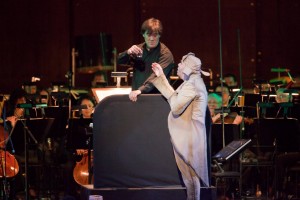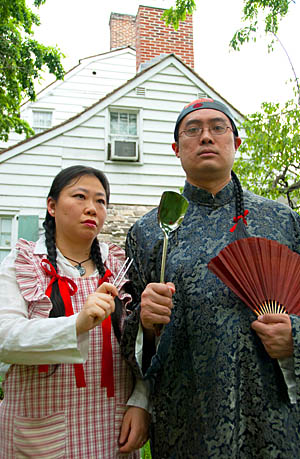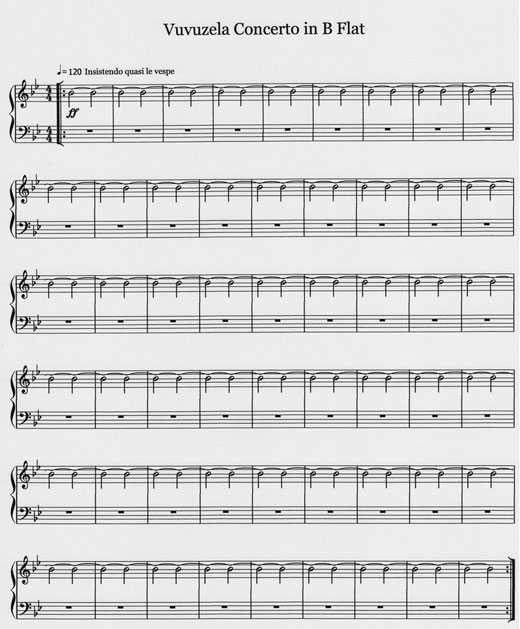 The International Contemporary Ensemble will be featured at 7 PM tonight on Q2. Hosted by John Schaefer, this live broadcast from Yamaha Piano Salon in NYC is a sneak preview of Lincoln Center Festival’s Varèse: (R)evolution.
The International Contemporary Ensemble will be featured at 7 PM tonight on Q2. Hosted by John Schaefer, this live broadcast from Yamaha Piano Salon in NYC is a sneak preview of Lincoln Center Festival’s Varèse: (R)evolution.
(R)evolution will present the composer’s entire oeuvre over two concerts on July 19 &20. Performers include the New York Philharmonic, conductor Alan Gilbert, percussionist Steven Schick, and ICE.
Program:
Density 21.5 (1936) with Claire Chase, flute
Un Grand Sommeil Noir (1906) with Samantha Malk, soprano
Ameriques (NEW YORK PREMIERE of 8-hand piano version) (1929) with Jacob Greenberg, Amy Williams, Amy Briggs and Thomas Rosenkranz
Q2 and ICE have been kind enough to share a freebie that all the new music kids will be adding to their Droid/iPhone/Blackberrys: a Poème Électronique ringtone!
 Jeremy Podgursky — one of the composers we liked so much that he ended being selected for our last S21 concert presentation — is throwing a joint shindig with fellow composer Daniel Wohl, this Thursday July 8th, 7:00pm at the littlefield performance/art space (622 Degraw Street, between 3rd and 4th Avenue, Brooklyn), $8.00.
Jeremy Podgursky — one of the composers we liked so much that he ended being selected for our last S21 concert presentation — is throwing a joint shindig with fellow composer Daniel Wohl, this Thursday July 8th, 7:00pm at the littlefield performance/art space (622 Degraw Street, between 3rd and 4th Avenue, Brooklyn), $8.00.
 Performers include Sara Budde, clarinet; Emily Popham Gillins, violin; John Popham, cello; Kevin Sims, percussion; Bethany Pietroniro and Timo Andres, piano; and more TBA. Podgursky and Wohl will be splitting the bill alternating their way through nine works in all, featuring recent small ensemble, electronic/electro-acoustic and solo pieces. Two excellent composers, nine excellent pieces, a whole posse of excellent performers, quite the value for the small tix price.
Performers include Sara Budde, clarinet; Emily Popham Gillins, violin; John Popham, cello; Kevin Sims, percussion; Bethany Pietroniro and Timo Andres, piano; and more TBA. Podgursky and Wohl will be splitting the bill alternating their way through nine works in all, featuring recent small ensemble, electronic/electro-acoustic and solo pieces. Two excellent composers, nine excellent pieces, a whole posse of excellent performers, quite the value for the small tix price.
From today’s NY Times:
Award-winning Russian pianist Mikhail Pletnev has been arrested at a Thai beach resort, accused of raping a boy, police said Wednesday.
 The last thing that Alan Gilbert or the New York Philharmonic needs is another affirmation that they have done something important and memorable by producing Le Grand Macabre in May. There were three (perhaps more?) New York Times articles over 11 days (May 18th, 23rd, 28th), an nice summary over on Anne Midgette’s Washington Post blog, and from just a few days ago there was this over at Newsweek. Of course our own site added to the frenzy of press/buzz here, here, here, here, here, here, and here – and with good reason! I’m quite happy to throw my hat in the camp who counts themselves lucky to be one of the few to see this amazing production. It was everything that I had hoped it would be, and I even got a fancy collectors-edition-style booklet of the libretto with the program.
The last thing that Alan Gilbert or the New York Philharmonic needs is another affirmation that they have done something important and memorable by producing Le Grand Macabre in May. There were three (perhaps more?) New York Times articles over 11 days (May 18th, 23rd, 28th), an nice summary over on Anne Midgette’s Washington Post blog, and from just a few days ago there was this over at Newsweek. Of course our own site added to the frenzy of press/buzz here, here, here, here, here, here, and here – and with good reason! I’m quite happy to throw my hat in the camp who counts themselves lucky to be one of the few to see this amazing production. It was everything that I had hoped it would be, and I even got a fancy collectors-edition-style booklet of the libretto with the program.
Some time has gone by since the production (I’m late on my contribution to this, as per my usual), I think it’s enough for me to say that I thought it was great, and to move on to some questions.
After reading all of the press about the production, it seems that everyone who saw it easily and quickly deemed it a huge success. But I’d love to know if the Philharmonic thought it was a success! All three nights sold-out, but we know that a sold-out show doesn’t necessarily mean success. Le Grand Macabre was without question an unusual and elaborate production and must have come with a tremendous expense – just watch this video. All the extra marketing, and YouTube videos; all the lighting and projections and costumes; (presumably) all the extra rehearsals and percussion instruments; etc, etc, etc. I think the big question is: was this a successful enough event that the Philharmonic will continue these kinds of productions in the future? Was dealing with disgruntled subscribers worth it? Was the cost of the “spectacle” worth it? Was all the marketing and rogue videos worth it?
Of course I hope that the answer to all of these questions is yes. I would love to see the New York Philharmonic continue to support contemporary music the way it has since Mr. Gilbert has arrived. It’s clear that he feels very strongly about new music: he brought in Magnus Lindberg, started the Contact! series, and made this incredible Ligeti production happen. I want to know what else he has planned and what else the Philharmonic is willing and capable of doing. But, it seems that a lot of it depends on whether or not the Philharmonic thought Macabre was a success.
There’s yet another new music series here in San Diego: Connections Chamber Music. I reported earlier this year on their concert featuring Reich, John Adams, Daugherty, and Matthew Tommasini (the series director). For their last concert, they programmed the Quartet for the End of Time. Before I went to the concert, I marvelled at how I’ve heard the Quartet more frequently than plenty of 19th century chamber works just as great such as Beethoven’s op. 132. And–well, read my thoughts and review of the concert here.
 Jason Robert Brown, composer of Parade and lots of other excellent musical theater music, has a valuable post on his blog today about his attempts to persuade internet “traders” from illegally offering his sheet music for download for free. Brown joined one of the peer-to-peer communities that had a lot of his work listed and contacted about 400 users, politely asking them to stop offering his material. Most complied, some had no idea what he was talking about, and a few resisted. The issue of who benefits and who loses from the widespread distribution of his work is raised in a lengthy exchange he had with a teenage girl named Brenna…ur, Eleanor… which provides some insights into both perspectives of the copyright debate.
Jason Robert Brown, composer of Parade and lots of other excellent musical theater music, has a valuable post on his blog today about his attempts to persuade internet “traders” from illegally offering his sheet music for download for free. Brown joined one of the peer-to-peer communities that had a lot of his work listed and contacted about 400 users, politely asking them to stop offering his material. Most complied, some had no idea what he was talking about, and a few resisted. The issue of who benefits and who loses from the widespread distribution of his work is raised in a lengthy exchange he had with a teenage girl named Brenna…ur, Eleanor… which provides some insights into both perspectives of the copyright debate.
I know a lot of composers who are pleased to allow people to download their music free and distribute it to whomever they like because they believe doing so provides exposure to their work and grows their “brand” (to use an overused marketing term). Others believe their music is their intellectual property and they should be paid for any use. Where you stand seems to depend upon how commercially “successful” you are. If you’re relatively unknown and there is little demand for your music, giving it away is a great strategy. If there is a market demand for your work in various forms, it’s not.
Who has thoughts on this topic?
I just got off the phone with a reporter from the Chicago Reader, who read our February 12th coverage of Eighth Blackbird’s Composition Competition (on Twitter, this came to be known as the “8Bb boo-boo” post).
In the initial post, I’d expressed my disappointment at finding out that Eighth Blackbird, an ensemble for whom I had a great deal of respect as new music performers, was charging a $50 entry fee for their competition. As the post’s title indicated, it seemed apparent that the competition’s prize would easily be self-funded by application fees, with plenty left over.
We had a lot of comments on the post. This discussion revealed a wide range of viewpoints on the subject, both pro and con. Some posters pointed out that instrumentalists are routinely required to pay robust fees for auditions; why should composers? Others suggested that the ensemble was right in charging a fee, as they would be spending time adjudicating the contest and deserved compensation for that time. But others agreed with me that self-funded commissions are a problematic aspect of far too many composition competitions.
The variance of opinion didn’t hew to a composer vs. performer divide; one of Sequenza 21’s regular contributors, composer Lawrence Dillon, mounted a vigorous defense for the competition’s guidelines. Dennis Bathory-Kitsz, on the other hand, went even further than I did in strenuously rebutting the idea of high application fees and self-funded commissions.
Shortly after our post, and commentary elsewhere on the web, Eighth Blackbird announced that they were postponing the competition to rethink and revise its guidelines. They have recently announced a new competition. Partnering with the American Composers Forum and MakeMusic, Eighth Blackbird will undertake the Finale® National Composition Contest. You can read the competition’s guidelines here.
As I pointed out in my interview with the Reader (the article will run next Thursday, if you’d like to see what they make of it), the Finale competition improves on the previous contest in several ways. Some highlights:
-Each contestant may send up to three works, composed in the last five years, that demonstrate how they would write for Eighth Blackbird. One may include CDs, DVDs, and scores.
– There’s no more application fee; composers may pay a nominal amount ($5) if they’d like for their materials to be returned. Like all good competitions, it remains anonymous. There are no age restrictions.
– Three finalists will each receive $1000 and a $500 travel stipend. They will workshop the piece for a weekend with Eighth Blackbird. The winner will receive $2000 and a performance by 8Bb.
-None of the prizes is a king’s ransom; but paying finalists a travel stipend and giving them the opportunity to workshop their piece with the ensemble are significant opportunities not afforded by many competitions.
I think that this competition will better serve both emerging composers and the ensemble. By partnering with Finale and ACF, 8Bb has high-profile sponsors who are helping to offset some of the administrative costs that were previously passed along to composers. The affiliation with Finale will doubtless garner more attention and publicity for the competition. I’d imagine it will also help to get the word out to a wider and more diverse pool of emerging composers.
I, for one, am pleased that our discussion about composition competitions on Sequenza 21 seems to have made a positive impact. I’m also glad to be able to thank Eighth Blackbird publicly for being receptive to criticism and open to discussion. Their willingness to listen to what composers have to say – and then act on it- is another brand of advocacy that’s all too rare and greatly appreciated.
The deadline is September 15th, so get writing!
 Staying in NYC this 4th of July holiday weekend? Then come partake of some musical fireworks and pan-patriotic pride as vocalist extraordinaire Phillip Cheah (his vocal range could well classify him as “soprano/baritone”) and pianist Trudy Chan serve up American Dim Sum – A celebration of the American song.
Staying in NYC this 4th of July holiday weekend? Then come partake of some musical fireworks and pan-patriotic pride as vocalist extraordinaire Phillip Cheah (his vocal range could well classify him as “soprano/baritone”) and pianist Trudy Chan serve up American Dim Sum – A celebration of the American song.
The carts will be full of dishes of American fare: beloved songs by Ned Rorem, Samuel Barber, Dominick Argento, Aaron Copland, Amy Beach, and Jack Beeson, as well as exotic delicasies by John Cage (The Wonderful Widow of Eighteen Springs), Henry Cowell (Three Anti-Modernist Songs, written during his incarceration at San Quentin), Milton Babbitt (songs from a never-produced Broadway musical, Fabulous Voyage), and Nicolas Slonimsky (early pieces rediscovered at the Library of Congress with the help of his daughter, Electra Yourke). Topping off the festivities will be a belated, 28-years-in-the-making world premiere of songs from the nurturing river by the the friendliest iconoclastic enfant terrible around, Frank J. Oteri.
It’s all going down Saturday, July 3rd, 7:00 PM, at the Church of St Luke in the Fields (487 Hudson Street @ Grove). Only $10 to stuff yourself silly, so bring a hungry ear or two.
